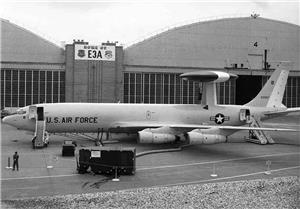On April 17, 1969, Boeing wins the contract to design the Airborne Warning and Control System (AWACS). The AWACS, a modified Boeing 707 with a rotating radar dome, provides airborne surveillance command, control, and communications for air defense forces. The rotating radar provides a 360-degree view and can detect sea and air targets simultaneously.
In the Gulf War
The Boeing AWACS, still in production (1999), is a mainstay of U.S. and NATO forces. In 1990 and 1991, these planes were extensively and successfully used during Operations Desert Shield and Desert Storm.
Sources:
Walt Crowley, Rites of Passage: A Memoir of the Sixties in Seattle (Seattle: University of Washington Press, 1995), 268.
Licensing: This essay is licensed under a Creative Commons license that
encourages reproduction with attribution. Credit should be given to both
HistoryLink.org and to the author, and sources must be included with any
reproduction. Click the icon for more info. Please note that this
Creative Commons license applies to text only, and not to images. For
more information regarding individual photos or images, please contact
the source noted in the image credit.

Major Support for HistoryLink.org Provided
By:
The State of Washington | Patsy Bullitt Collins
| Paul G. Allen Family Foundation | Museum Of History & Industry
| 4Culture (King County Lodging Tax Revenue) | City of Seattle
| City of Bellevue | City of Tacoma | King County | The Peach
Foundation | Microsoft Corporation, Other Public and Private
Sponsors and Visitors Like You

